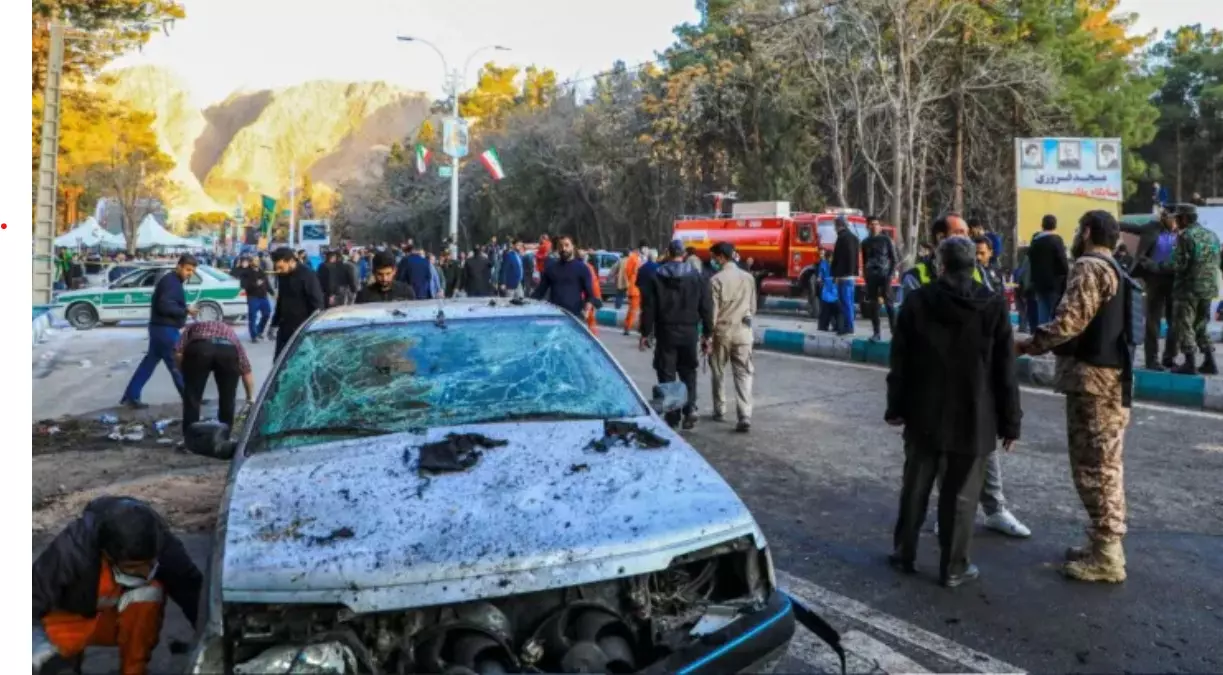Strategic setback
The gruesome Kerman bombings in Iran at the behest of the Islamic State has hit the country hard, slowing down its operations at a broader geopolitical level

Amid continued reports of Iran openly backing Hamas in the ongoing Israel conflict in Gaza, Hezbollah of Lebanon, and the Houthis of Yemen, it was struck by deadly terror assaults on January 3, coinciding with the death anniversary of General Qassem Soleimani, who was killed by a precise drone attack exactly four years ago. The fresh terror attack has hit Iran hard, as the Kerman bombings, at the very site of Soleimani’s grave, killed more than a hundred Iranians and grievously injured many. The Islamic State (IS) has claimed responsibility for this dreaded act of terror and is seen to demoralise Iran’s strategy to take on Israel in support of Hamas and other supporters of the Palestine cause, while the initial suspicion of Iran for this attack was towards Israel or the US. Owning this act of terror by IS has raised questions about why IS should target Iran, and now? The timing is equally significant as the attack comes at a time when fears of a regional war involving Israel and Iran are very much on the rise in West Asia.
To put things in perspective, the IS, which is a Sunni Salafi jihadist outfit, sees Iran as a theocratic state and its principal foe. The IS’ track record of targeting Shias and their institutions is well known. The IS also perceives Iran as a formidable enemy, as Iran-supported elements played a crucial role in defeating the jihadists in several areas in Syria and Iraq when IS supremo Al Baghdadi was on its ascent.
On its part, Iran sees in the IS a clear attempt to revive the lethal conflict of the early years of Islam between the Shias and the Sunnis. With their incessant anti-Shia tirade, punctuated with violence, the IS wants to foment sectarian hatred among hardened Sunni rank and file to create a wider war to hit out at the minority Shia lot in Sunni-majority countries, including Iran.
To counter the IS onslaught, Iran had embarked upon a strategy by inducting, training, and rushing militias to Syria when Syria was beleaguered by the Civil War more than a decade ago. The most recent terror attack, being dwelt upon now, is hard to forget for the Iranians, especially as it occurred on Soleimani’s death date. It may be recalled that Soleimani’s image in Iran is more than reverential. Soleimani was a soldier during the Iran-Iraq conflict of the eighties. He was subsequently the Commander of the Quds Force, the external operational wing of the Islamic Revolutionary Guard Corps (IRGC). Soleimani is largely thought to be responsible for giving a definite shape to Iran’s defence-linked strategy, which sought to build regional strength through a syndicate of Shia groups, including the creation of Hezbollah. Also, under his dynamic leadership, Iran built robust ties with Shia rebels and Houthis in Yemen.
Analytically speaking, the recent Kerman bombings, the worst terror attack in Iran’s history, point to Iran’s intensified security vulnerabilities. Equally disturbing for Iran is the growing and expanding operational capabilities of the IS. According to the well-known security columnist Stanly Johny, "while all Arab countries restrained themselves to diplomacy to address Israel’s bombing of Gaza, which has killed at least 22,000 people in 90 days, Iran-backed groups have attacked Israel and the US positions in solidarity with Palestinians." Johny further states, "For Iran, the challenge is to tackle both the traditional external security threats and a relatively new yet growing internal security threat at the same time."
Judging by this gruesome bombing in Kerman, it would appear that it might slow down Iran’s operations, whether on its logistic support to Hezbollah or Hamas in Gaza, or it might, in all likelihood, lower its scale of operations using the Houthis in targeting the merchant vessels in the Gulf of Aden or the Red Sea. However, this said, going by Iran’s previous record of nurturing vengeance, it might wait in the wings for some time as a tactical measure for the dust to settle down, then plan something "big" as a retaliatory measure. Yet, realistically, Iran is now bereft of a military personality like Qassem Soleimani, whose battle prowess combined with an inimitable charm is missed. Iran perhaps requires that kind of military leadership to sit up and hit back at a time when all its enemies have zeroed in to strike Iran with all impunity.
The writer is a retired IPS officer, Adviser NatStrat, and a former National Security Advisor in Mauritius. Views expressed are personal



